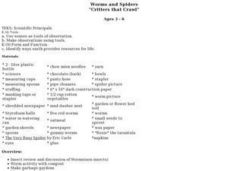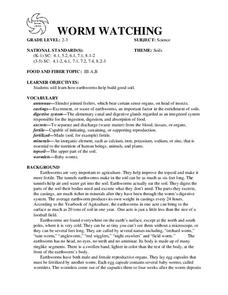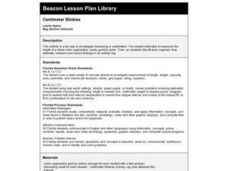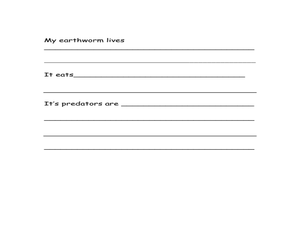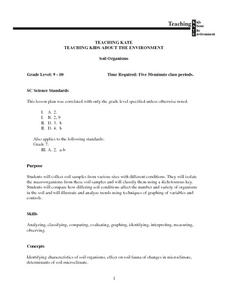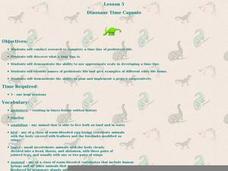Curated OER
A Design You’ll Dig: Designing a Habitat for Worms
Students discover how worms contribute to the balance of the environment. In this composting lesson plan, students study the composting and decomposition processes. Students then create habitats for worms that allow them to do their jobs.
Curated OER
Worms and Spiders: "Critters That Crawl"
Students complete a unit of lessons on spiders and worms. They discuss worm and spider characteristics, create a garbage garden, observe worms, create gummy worm prints, read the book, 'The Very Busy Spider,' and construct a spider and...
Curated OER
I Can Use a Worm to Count
Kindergarteners use worms, puppets or other props to practice counting to 100. First, they listen to a read aloud of Count Worms by Roger Hargeaves. A worm pattern is used to count to 100, with each segment of the worm representing a...
Curated OER
Worm Interviews
Students identify types of worms. In this organisms instructional activity, students are shown slides of the different types of worms and take notes on each worm. Students answer questions about each worm.
Curated OER
Wonderful Worms
Students identify living and non-living things and explain the importance of earthworms to the soil. They name some basic facts about earthworms, recognize basic worm vocabulary words and demonstrate vermicomposting techniques.
Curated OER
The Dirt on Worms!
Fourth graders make predictions, observe, collect and record data. They investigate several soil and worm websites. Finally, 4th graders write a letter to The President which defends earthworms by explaining their value to the United...
Curated OER
WORM WATCHING
Students investigate how earthworms help build good soil. They examine the worms carefully to find the ringlike segments and swollen band at the front of the earthworm's body. Students take turns dampening the soil every day and adding...
Curated OER
Worms Crawl In and Do Lots of Things
High schoolers observe the aquatic segmented worm, Lumbriculus varigatus and the life processes. They explore the processes of nutririon, transport, regulation, locomotion, and removal of wastes.
Curated OER
Life Processes
Students identify life processes and create their own creature. In this creative science lesson, students identify an organism's life processes and categorize them into groups. They then create their own creature and write about how it...
Curated OER
Centimeter Slinkies
Third graders estimate and measure the length of a whole color-segmented, candy gummy worm. Then, as students bite off each segment, they estimate, measure and record findings in an activity log.
Curated OER
Experiment on Minimal Segment Size Regeneration of Lumbriculus variegatus
The experiment allows students to observe regeneration of tailless and headless worm segments into complete individuals. Data of a completed experiment are included as well as a student activity sheet.
Curated OER
More Bait for Your Buck!
Students determine where to buy the heaviest earthworms as they study invertebrates. They create a double bar graph of the results of the weight data.
Curated OER
Convening, Creating, and Conventioneering
Students study coelenterates. In this science lesson plan, students author a story regarding the life cycle of coelenterates following an in depth study of the creatures.
Curated OER
Earthworms and Making a Wormery
Learners explore the environment by researching insects. In this earthworm lesson, students utilize soil and plexiglass to build a see through wormery in which learners can observe the worms at work. Students identify the benefits of...
Curated OER
Earthworm Animation
Students use animation to create their own earthworm catching and eating its prey. They must draw storyboards before they start on the animation.
Curated OER
What is an Earthworm Like?
Second graders study earthworms. In this science lesson, 2nd graders observe an earthworm using a magnifying lens, draw pictures of the earthworm, and record their observations.
Curated OER
Invertebrate Vocabulary-- Marine Invertebrate Match
In this science worksheet, students study 12 vocabulary words which pertain to marine invertebrates. Students read the definitions which include pronunciation, part of speech and meaning of the name. Students then look at 16 organisms...
Curated OER
What Animal Am I?
Students brainstorm different characteristics of invertebrates and investigate invertebrates by conducting Internet research.
Curated OER
A Tail to Tell
Students observe populations of Lumbriculus to discover some of the adaptations that allow them to live successfully along the shores of ponds and marshes. They also design and perform experiments to test proposed hypotheses for these...
Curated OER
Meeting an Earthworm
Students inspect the anatomy of earthworms. In this earthworm lesson, students participate in a hands-on experiment as they analyze the structure of earthworms. Students demonstrate mastery through differentiated products. Lesson...
Curated OER
Infectious Disease Detectives
Students participate in a simulation of how diseases are transmitted. Each student holds a test tube, with only one containing the "disease" while the others have water. They move around the room until told to stop. Using droppers to...
Curated OER
Soil Organisms
Students work together to collect soil samples from different locations. In the samples, they identify the macroorganisms and classify them. They identify the conditions that affect how macroorganisms grow. They also analyze and identify...
Curated OER
Bug Hunt
Students examine the different characteristics of bugs in their local area. They take characteristics of bugs they have observed and create their own new insect. They draw their new bug and share it with the class.
Curated OER
Dinosaur Time Capsule
Third graders research prehistoric life using educational software. They design a prehistoric life while showing the use of appropriate scale and names for the prehistoric life. They follow an internet link to participate in a virtual...



